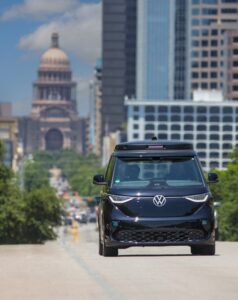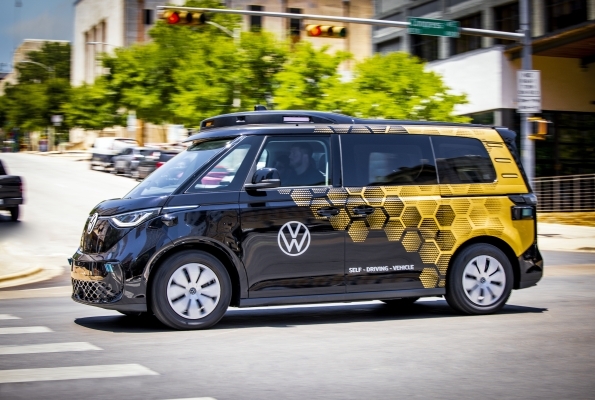
Volkswagen’s autonomous EVs to hit Texas streets this month
By onTechnology
Volkswagen says it will start rolling out its autonomous vehicle test program this month by trialing 10 of its ID. Buzz electric vans in Austin, Texas.
The automaker also revealed last week that it plans to bring its test fleet to at least four other U.S. cities within the next three years with the goal of commercially launching self-driving vehicles in Austin by 2026.
“Expanding our autonomous vehicle program to the North American region is the next step in our global strategic roadmap, and the result of a long-term collaborative investment,” said Christian Senger, a Volkswagen Commercial Vehicles board management member. “Moving into this next phase will help us test, validate and refine technology, bring us closer to establishing commercially available transportation offerings, and eventually grow the diverse mobility portfolio for the Volkswagen Group.”
Volkswagen’s re-entry into the U.S. autonomous driving fray comes less than a year after it announced Argo AI, its joint venture with Ford to develop self-driving vehicle technology, was shuttered.
Volkswagen said it plans to employ team members who worked with Argo AI on its global autonomous vehicle research and development. It has established a subsidiary called Volkswagen ADMT LLC to support its U.S. autonomous driving rollout, it said in a press release.

The EVs being tested in Austin will be equipped with an autonomous driving technology platform that includes cameras, radar, and lidar technology, Volkswagen said. It added that there will be a person inside the vehicles at all times during the initial test phase.
The OEM said it will use its ID. Buzz vans to collect data across a “diversity of driving scenarios.”
“We are excited and ready to roll out our autonomous pilot and test fleet in Austin”, said Katrin Lohmann, president of Volkswagen ADMT LLC. “We selected Austin as the first U.S. hub, as the city has a track record for embracing innovation and offers a conducive climate for the testing of autonomous vehicles.”
Meanwhile, Tesla CEO Elon Musk once again claimed last week that Tesla models would soon be autonomous, this time saying he believes they’ll be available this year.
Musk made the comments while delivering opening remarks at an artificial intelligence conference in Shanghai, according to media reports.
“In terms of where Tesla is at this stage, I think we are very close to achieving full self-driving without human supervision,” Musk said.
“This is only speculation, but I think we’ll achieve full self-driving, maybe what you would call four or five, I think later this year.”
He appeared to be referring to SAE Level 4 autonomy, which doesn’t need a human at all in certain locations, and Level 5 which is a car that can handle any road conditions that a person could.
It’s worth noting that consumers are less enthusiastic about autonomous and semi-autonomous features than they are about advanced driver assistance systems (ADAS), according to a newly-released report.
Trust and familiarity remain barriers preventing drivers from embracing self-driving technologies, S&P Global Mobility’s newly released Global Mobility spring survey found.
“There is a lack of exposure to the mainstream consumer,” said Yanina Mills, senior technical research analyst at S&P Global Mobility. “They don’t exactly know how it is going to work. There is confusion. They are asking, ‘Is it self-driving, or is it just going to help me a bit and I still have to focus?’”
Images
Featured and secondary image credit: Courtesy of Volkswagen
